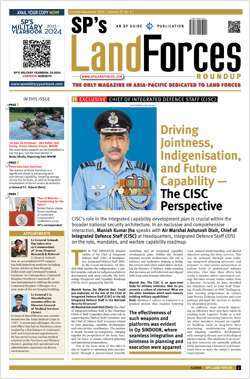INDIAN ARMED FORCES CHIEFS ON OUR RELENTLESS AND FOCUSED PUBLISHING EFFORTS

The insightful articles, inspiring narrations and analytical perspectives presented by the Editorial Team, establish an alluring connect with the reader. My compliments and best wishes to SP Guide Publications.

"Over the past 60 years, the growth of SP Guide Publications has mirrored the rising stature of Indian Navy. Its well-researched and informative magazines on Defence and Aerospace sector have served to shape an educated opinion of our military personnel, policy makers and the public alike. I wish SP's Publication team continued success, fair winds and following seas in all future endeavour!"

Since, its inception in 1964, SP Guide Publications has consistently demonstrated commitment to high-quality journalism in the aerospace and defence sectors, earning a well-deserved reputation as Asia's largest media house in this domain. I wish SP Guide Publications continued success in its pursuit of excellence.
- Appointments Committee of Cabinet approves one-month extension in service of Chief of the Army Staff
- Prime Minister witnesses 'Bharat Shakti' – a Tri-Services Firing and Manoeuvre Exercise in Pokhran, Rajasthan
- Interim Defence Budget 2024-25 — An Analysis
- Union Defence budget 2024
- Indian Army: In quest of greater firepower and policy recommendations for gaps
- Indian Army Annual Press Conference 2024
- Tata Boeing Aerospace Delivers 250 AH-64 Apache Fuselages, Manufactured in India
Made in India Semiconductor Chip
India is rapidly developing its semiconductor industry, with the India Semiconductor Mission (ISM) leading efforts to foster a robust ecosystem
 |
The Author is Former Director General of Information Systems and A Special Forces Veteran, Indian Army |
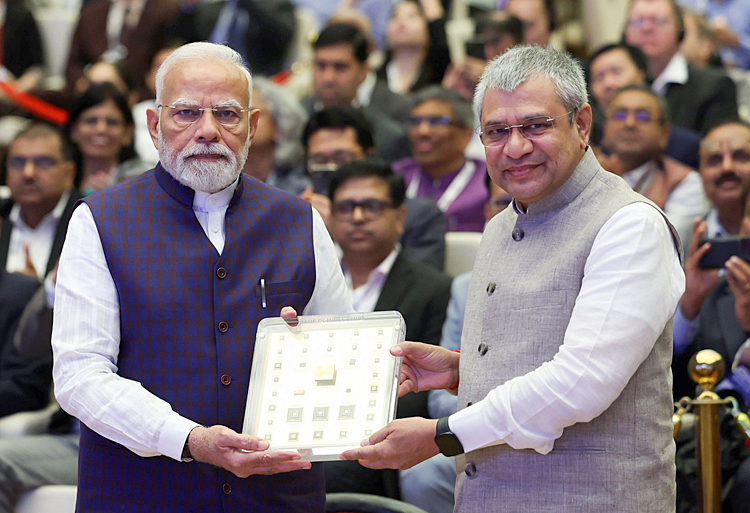
On September 2, 2025, at the inaugural session of 'Semicon India 2025', IT and Electronics Minister Ashwini Vaishnav presented the first 'Made in India' chip, the Vikram-32 processor to Prime Minister Narendra Modi. The chip has been developed by the Indian Space Research Organisation's (ISROs) Semiconductor Laboratory (SCL).
Prime Minister Narendra Modi highlighted India's push to build a full semiconductor ecosystem and mentioned that India will soon not just design chips but also emerge as a major global market
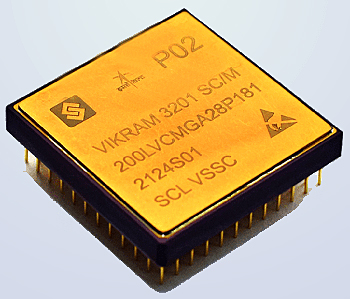
Inaugurating 'Semicon India 2025', Prime Minister Narendra Modi highlighted India's push to build a full semiconductor ecosystem and mentioning that India will soon not just design chips but also emerge as a major global market, said, "The participation of 30–40 countries at Semicon, along with the energy of our youth and the spirit of innovation, shows that the world trusts India and is ready to shape the future of semiconductors with us." He said that while oil shaped the global economy in the last century, in this century, power lies in the small semiconductor chip. He assured that as the global semiconductor market heads towards becoming a $1 trillion economy, India will secure a significant share of it, and noted that around $18 billion has been invested across 10 semiconductor plants, and lauded the single-window clearance system, which has reduced the time from 'files to factories' and helped attract more global investors to India's semiconductor industry.
Vaishnav said, "India has a cost advantage of 15–30 per cent across multiple manufacturing segments of electronics, mobile phones, laptops, and now semiconductors. As fabs move from pilot lines to commercial production, customer validation and acceptance will follow, strengthening India's position in the global ecosystem." Highlighting India's rapid progress on its semiconductor mission, he emphasised that exports will be a key focus, noting that of the ten sanctioned projects, production is aimed not only at meeting domestic demand but also serving the global market.
IT and Electronics Minister Ashwini Vaishnav highlighted that in ISM 2.0 (Indian Semiconductor Mission), support will be extended for developing complete products, chipsets designed and developed in India, with IP and companies incorporated here
Vaishnav also highlighted that In ISM 2.0 (Indian Semiconductor Mission), significant focus will also go to equipment manufacturers, material suppliers, and other ecosystem partners, and said, "In ISM 2.0 support will be extended for developing complete products, chipsets designed and developed in India, with IP and companies incorporated here. These will be over and above what was done under ISM 1.0." On India's plans to develop its own AI chip or GPU, Vaishnav said developing processors is definitely a priority, adding, "A lot of work is already underway, with institutions like IIT Madras, C-DAC, and others actively engaged in this effort." When asked whether stronger relations with China could offer an alternative to the West, Vaishnav stressed that all major successes in the semiconductor sector globally have been built on collaborations.
S. Krishnan, Secretary, Ministry of Electronics & IT, explained India's strategy to stay competitive. He said that while different nations are focusing on different semiconductor nodes, India is targeting the nodes that best suit its economy, and added, "There is no direct conflict. This industry has always been foundational and subsidised by governments worldwide, and India is no exception. Our approach is calibrated, and the results are already visible in the number of companies that have come forward and the projects announced."
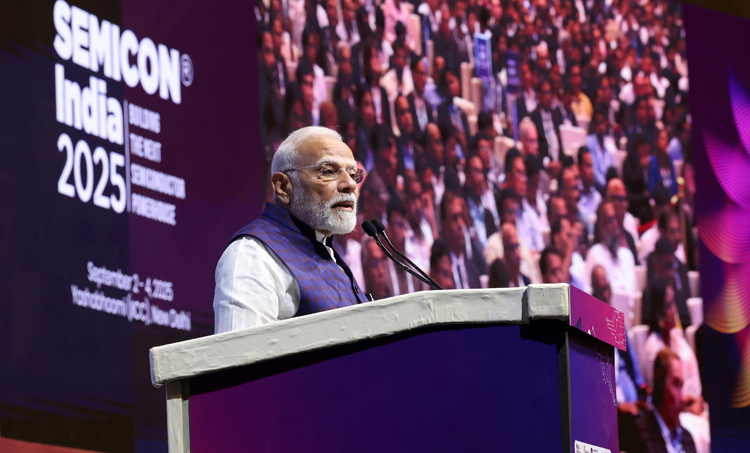
Prime Minister Narendra Modi was joined at the inauguration of Semicon India 2025 by Union Minister Ashwini Vaishnaw (Ministry of Electronics & Information Technology), Delhi Chief Minister Rekha Gupta, Odisha Chief Minister Mohan Charan Majhi, Minister of State for Electronics and IT Jitin Prasada, as well as CEOs of global semiconductor companies and international investors. Semicon India 2025 witnessed over 20,750 attendees, including more than 2,500 delegates from over 48 countries, over 150 speakers, including over 50 global leaders, and more than 350 exhibitors. It also included six countries round table discussions, country pavilions and dedicated pavilions for Workforce Development & Start-Ups among others.
India is rapidly developing its semiconductor industry, with the India Semiconductor Mission (ISM) leading efforts to foster a robust ecosystem. Key players include ISRO's SCL - India's only integrated chip manufacturer; Tata Electronics and CG Power & Industrial Solutions, which are establishing new facilities and partnerships to boost production; and emerging companies like Polymatech Electronics focused on specialised sectors. The focus is shifting from design to manufacturing and assembly, supported by government initiatives like the modified Semicon India Programme.
Union Cabinet of India approved four new semiconductor manufacturing projects within the framework of the ISM, raising the total number of sanctioned semiconductor projects under ISM to 10, spanning six different states, with cumulative investment commitments reaching around ₹1.60 lakh crore (approximately $18.23 billion).
ISM is the agency to implement India's long-term strategy for developing semiconductor and display manufacturing facilities, as well as a strong design ecosystem. It is working with global experts and companies through partnerships with entities like the EU, Japan, and Purdue University to build supply chain resilience and foster innovation. Efforts are underway to set up pilot lines and Outsourced Semiconductor Assembly and Test (OSAT) facilities, with the first CG Power facility in Gujarat, marking a step towards end-to-end 'Made in India' chip production. Major semiconductor chip companies in India include: MosChip Technologies, Tata Elxsi. ASM Technologies, Bharat Electronics Limited, CG Power and Industrial Solutions, Dixon Technologies, HCL technologies, Spel Semiconductors, Vedanta Ltd, Applied Materials, Micron Technology, AMD, Broadcom, Samsung, Arm, Havells India Limited, Intel, NXP, Qualcomm, Hitachi Energy India, ABB India Ltd, CDIL, MIC Electronics and Polycab India Ltd.
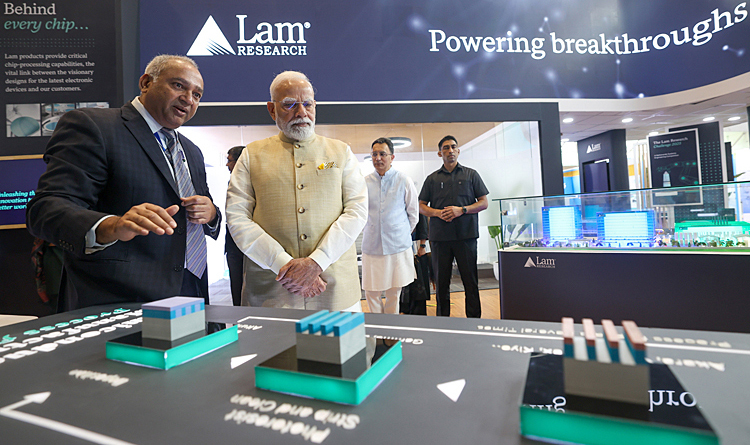

Earlier on August 12, 2025, the Union Cabinet of India approved four new semiconductor manufacturing projects within the framework of the ISM, raising the total number of sanctioned semiconductor projects under ISM to 10, spanning six different states, with cumulative investment commitments reaching around ₹1.60 lakh crore (approximately $18.23 billion). These new projects are to be established one each in Odisha, Punjab and Andhra Pradesh, and two in Odisha; overall involving investment of approximately ₹4,600 crore ($524 million) and are expected to generate direct employment for over 2,000 skilled professionals.
These projects represent substantial technological advancements in India's semiconductor capabilities, including the country's first commercial compound semiconductor fabrication facility located in Bhubaneswar's Info Valley, Odisha.
These projects represent substantial technological advancements in India's semiconductor capabilities, including the country's first commercial compound semiconductor fabrication facility by SiCSem in collaboration with the UK's Clas-SiC Wafer Fab Ltd, located in Bhubaneswar's Info Valley, Odisha.This compound semiconductor fab will manufacture Silicon Carbide (SiC) devices, crucial for applications across defence, electric vehicles (EVs), railways, fast chargers, data centres, consumer appliances, and solar power inverters. It will have an annual production capacity of 60,000 wafers and 96 million packaged units. Another project in Odisha is by 3D Glass Solutions Inc., which will establish a semiconductor packaging and embedded glass substrates, introducing world-leading packaging technology to India with an annual capacity to handle 69,600 glass panel substrates, 50 million assembled units, and 13,200 advanced modules. These products will cater to industries like defence, artificial intelligence, high-performance computing, automotive, photonics, and communication systems.
The Punjab project involves Continental Device India Pvt Ltd (CDIL), which is expanding its facilities to produce high-power devices like MOSFETs and IGBTs, supporting sectors such as automotive electronics, renewable energy, and power conversion technologies. Andhra Pradesh will host a manufacturing unit by ASIP Technologies, in partnership with South Korea's APACT Co. Ltd, focusing on producing semiconductor components for mobile phones, set-top boxes, and automotive applications.





